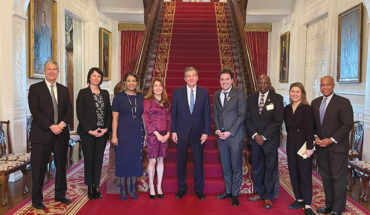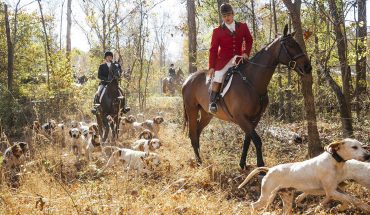by Lewis Beale
photographs by Shawn Rocco
It’s not that N.C. State men’s basketball coach Mark Gottfried hasn’t tasted winning in the past. He was an assistant the last time UCLA won a national championship, head coached a tournament-worthy team at tiny Murray State, and in his decade at University of Alabama ran a team that was at one point ranked number one in the country.
But that isn’t anything like the anticpation surrounding this year’s Wolfpack hoops squad. After last season, when the team won 24 games and made it to the Sweet 16 of the national tournament, Gottfried kept his key players, and recruited some future All-Americans. Now the Pack is faced with the highest expectations its had in years.
The path that brought Gottfried here prepared him well. As a young assistant coach at UCLA and acolyte to its master, John Wooden, Gottfried soaked up discipline, team chemistry, the magic properties of the 2-2-1 full court press. “Know what you teach, and teach what you know,” Wooden would say; Gottfried seared these words into his memory.
“I was 23 years old, I’m just out of college, starting to coach, and here I am sitting with John Wooden every night,” says Gottfried, now 48 and still awed by the experience. “It was a pearl of wisdom every single time you were with him.”
Gottfried is seated in his photo- and trophy-filled office in NCSU’s Weisiger-Brown athletic facility on the eve of what is widely expected to be a breakout season for the Wolfpack. For the first time in 37 years, the media has picked N.C. State to win the ACC. They’ve tapped junior forward C. J. Leslie as preseason ACC player of the year, and freshman guard Rodney Purvis as preseason rookie of the year. Four starters are back, and anticipation for a long-hoped-for Wolfpack championship is at a fever pitch. (As Walter went to press, the Wolfpack had just opened the season with a win.)
There’s little doubt about the framework that will guide Gottfried through this make-it-or-break-it season. He has been a follower of Wooden’s system – a mixture of philosophy and tactics – his entire coaching career. Framed on the wall is a copy of the rulebook: Wooden’s well-known Pyramid of Success. The system, which reaches a pinnacle of “competitive greatness” through virtues like industriousness, loyalty, self-control, skill, initiative, poise and confidence, has guided Gottfried for years.
And it has helped him to waste no time in executing a turnaround “of Homeric proportions,” as The News & Observer columnist Luke DeCock put it. Leading the team to the round of 16 in the NCAA tournament paid off in more ways than one, boosting his annual guaranteed pay to $1.95 million, putting him behind only Mike Kryzewski at Duke and Roy Williams at North Carolina in the ACC.
With success comes celebration. At a “Primetime with the Pack” event in mid-October, Gottfried zip-lined from the rafters to center court with the Superman theme song playing, then announced his goal of playing on “Monday night in April.” That would be the championship game.
Still, he plays down some of the hype and high expectations. “They’re too high,” he says. “I think we’re still a few years away from being a legitimate year-in, year-out, top 20 team.” Tell that to the energized Pack faithful, who are hoping they finally have a team that can show those Tar Heels and Blue Devils a thing or two.
Gottfried understands all of this. A University of Alabama graduate, outwardly he’s exactly how he describes himself: A “jeans, no socks, hop on a boat, drink beer kind of guy.” But this country boy charm does not disguise his competitive fire, a direct product of his background. Gottfried’s dad was a small college coach and athletic director, his uncle a Division 1 football coach. “Just being around those guys, just watching the interaction they had with their players, strategizing with their coaches and staff, that’s kind of what got me excited,” says Gottfried. “You get to understand the big picture more than a lot of people do.”
That big-picture perspective is evident during practices, where Gottfried’s rapport with his players is one of encouragement. He’s more of an energetic cheerleader than a Bobby-Knight-style screamer.
Wandering around the court, clapping his hands, shouting out words like “Fundamentals! Fundamentals!” he watches with a trained eye, gives tips, makes corrections, even cracks a joke or two: “Calvin closes out like Usain Bolt,” he says of junior forward C.J. Leslie during a recent guarding exercise.
At a certain point, Gottfried will call the players over to a dry-erase board on which he has written one of those homilies that coaches love, like “TEAM: Together Everyone Accomplishes More,” then give a short, animated pep talk in which words like “everybody,” “everyone” and “team” dominate. After that it’s back to running plays.
In college at Alabama, Gottfried was a hot-shot guard on the basketball team, known for his three-point shooting. He met his future wife Elizabeth there, at a Fellowship of Christian Athletes meeting.
“It turned out we had a class nearby at the same time,” she says. “I thought he was a lot of fun, very funny, and we laughed a lot. And I thought he was really cute.”
They married four years later, and even though Gottfried was drafted by the Detroit Pistons, he chose to sign on as a UCLA coach. “I didn’t want to turn down an opportunity to start at UCLA.” In other words, if it were a choice between being a borderline pro player (in Gottfried’s own estimation) or learning how to coach from a legend – heck, choose the legend.
After seven years as a UCLA assistant, which included a 1995 national championship, Gottfried decided it was time to accept a head coaching job. That led him to small, out-of-the-way, but hoops-crazy Murray State in Kentucky. “That was like moving from the central point of the universe to the farthest point,” says Elizabeth. “It was a dry county, 3,000 people in the town, very small, very country. They didn’t even have a Target.”
But for her husband, it was the perfect place to hone his skills. A school used to winning, but so far out of the mainstream it was barely a blip on ESPN screens. “It was a great opportunity to be at a good basketball school where winning was important, yet I felt how I could learn how to do my craft at this level without scrutiny,” he says. “The national media really isn’t paying attention.”
And without that spotlight, win he did. The Racers went 58-24 during Gottfried’s three years and twice went to March Madness. That success led to a job offer from Gottfried’s alma mater, where he took a team that was an after-thought – football being far and away the dominant sport in Tuscaloosa – and turned it into a national power, with one Elite Eight run in the national tournament, and a No. 1 ranking. Yet that second-class status rankled a bit.
“We were ranked No. 1 in the country, and you’re on the sixth page of the local paper the day after a game,” says Gottfried. “You go to the Elite Eight, and spring football is the topic of conversation. That can get frustrating, but it’s also part of the turf. You just need to learn that’s the way of life.”
Gottfried spent 11 seasons at Alabama, but the last few were painful. A combination of staff turnover and poor recruiting led to mediocre teams and a drastic drop in attendance; Gottfried resigned in the middle of the 2009 season. There was speculation that he would have been fired, to which Gottfried will only say, “It was time for them to make a change. I wish I had been better those last couple of years.”
Color commentator
Gottfried wasn’t unemployed for long. ESPN had noticed this glib, charismatic and media-friendly coach, and asked if he’d like to become a color commentator. “We cover the teams, we build relationships with the coaches, and in the back of our mind, this guy could be pretty good on TV,” says Mike Moore, Gottfried’s senior coordinating producer at the network. Gottfried spent two years at ESPN, a gig with which he “felt very much at ease.” But coaching was always in the back of his mind. So when the Wolfpack job opened up, and a key person in the hiring process was athletic director Debbie Yow, whom he had met while playing ball at Oral Roberts (Gottfried transferred to Alabama after his freshman year), he saw his chance.
Gottfried was not the school’s first choice. Several coaches were approached before Yow turned to her old friend, who, she said at the time, “has a fiery attitude and a can-do spirit. And that’s exactly what State needs at this time in our program.”
N.C. State was a step up for Gottfried. A school in a basketball-crazy area, hungry for a return to the Jimmy V days of the early ’80s, when the Wolfpack last won the NCAA tournament. Coaching in Raleigh means “you have a chance to win a national championship,” says Gottfried. “For me, it’s the chance to recruit the best players in the country, and it’s a place where basketball drives the bus.”
The Gottfried family has been lucky. The coach has changed jobs a lot less frequently than most people in his profession, and spending 11 years at Alabama meant that his five kids – four boys, one girl, two of them currently in college – were able to spend most of their school years there. And moving from Gulf Shores, Ala., where the family spent Gottfried’s ESPN years, was no big deal. “All of my children were excited,” says Elizabeth Gottfried. “And my daughter, who had decided to go to LSU, decided to come to N.C. State (Gottfried’s oldest son Brandon plays football at Stanford).
“There’s so much to do in Raleigh,” she adds. “To come here and have access to art, museums, walking trails, things like that, was very attractive to me.”
Family life is, in fact, at the top of Gottfried’s list of nonhoops priorities. Off days he’ll usually hang out with Elizabeth and the kids, and maybe go out to a movie. Gottfried loves “shoot ’em up, kill ’em up” films, and during a late August interview said he couldn’t wait to see Expendables 2. During the season he’s a hard worker, arriving at the office about 7 a.m., but even so, he’s usually home by 6:30 or 7 p.m., for his favorite dinner of steak and veggies. “I want some balance in my life,” he says. “I’ve been around coaches who stayed in their office until midnight every night, and I’ve always wondered what the heck they were doing.”
What Gottfried is doing is returning to the Wooden system, from which he had strayed in his last few years at Alabama. After all, if it could help John Wooden win 10 NCAA championships, why wouldn’t you want to use it? “A lot of coaches try to reinvent the game,” says Gottfried, “but I’d rather use the best system there ever was.”
Gottfried “has a philosophy he holds to, but has great patience with his players,” says Bobby Lutz, the team’s associate head coach. “He’s confident but humble, and that sets the stage for our staff and players.”
Adds senior guard Scott Wood: “Coach and his staff are more hands on” than the previous regime. “If they see a mistake, they’re quick to slow practice so people can understand. He wants us to learn the game.”
So everything seems set. The boat where Gottfried can kick back and enjoy a beer is at Wrightsville Beach. The family is glad to be in Raleigh. Basketball season is here.






